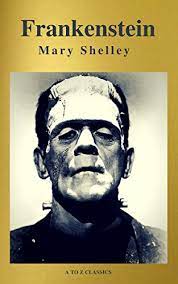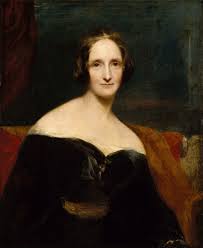Frankenstein Page #13
Frankenstein; or, The Modern Prometheus is an 1818 novel written by English author Mary Shelley. Frankenstein tells the story of Victor Frankenstein, a young scientist who creates a sapient creature in an unorthodox scientific experiment
How can I describe my emotions at this catastrophe, or how delineate the wretch whom with such infinite pains and care I had endeavoured to form? His limbs were in proportion, and I had selected his features as beautiful. Beautiful! Great God! His yellow skin scarcely covered the work of muscles and arteries beneath; his hair was of a lustrous black, and flowing; his teeth of a pearly whiteness; but these luxuriances only formed a more horrid contrast with his watery eyes, that seemed almost of the same colour as the dun-white sockets in which they were set, his shrivelled complexion and straight black lips. The different accidents of life are not so changeable as the feelings of human nature. I had worked hard for nearly two years, for the sole purpose of infusing life into an inanimate body. For this I had deprived myself of rest and health. I had desired it with an ardour that far exceeded moderation; but now that I had finished, the beauty of the dream vanished, and breathless horror and disgust filled my heart. Unable to endure the aspect of the being I had created, I rushed out of the room and continued a long time traversing my bed-chamber, unable to compose my mind to sleep. At length lassitude succeeded to the tumult I had before endured, and I threw myself on the bed in my clothes, endeavouring to seek a few moments of forgetfulness. But it was in vain; I slept, indeed, but I was disturbed by the wildest dreams. I thought I saw Elizabeth, in the bloom of health, walking in the streets of Ingolstadt. Delighted and surprised, I embraced her, but as I imprinted the first kiss on her lips, they became livid with the hue of death; her features appeared to change, and I thought that I held the corpse of my dead mother in my arms; a shroud enveloped her form, and I saw the grave-worms crawling in the folds of the flannel. I started from my sleep with horror; a cold dew covered my forehead, my teeth chattered, and every limb became convulsed; when, by the dim and yellow light of the moon, as it forced its way through the window shutters, I beheld the wretch—the miserable monster whom I had created. He held up the curtain of the bed; and his eyes, if eyes they may be called, were fixed on me. His jaws opened, and he muttered some inarticulate sounds, while a grin wrinkled his cheeks. He might have spoken, but I did not hear; one hand was stretched out, seemingly to detain me, but I escaped and rushed downstairs. I took refuge in the courtyard belonging to the house which I inhabited, where I remained during the rest of the night, walking up and down in the greatest agitation, listening attentively, catching and fearing each sound as if it were to announce the approach of the demoniacal corpse to which I had so miserably given life. Oh! No mortal could support the horror of that countenance. A mummy again endued with animation could not be so hideous as that wretch. I had gazed on him while unfinished; he was ugly then, but when those muscles and joints were rendered capable of motion, it became a thing such as even Dante could not have conceived. I passed the night wretchedly. Sometimes my pulse beat so quickly and hardly that I felt the palpitation of every artery; at others, I nearly sank to the ground through languor and extreme weakness. Mingled with this horror, I felt the bitterness of disappointment; dreams that had been my food and pleasant rest for so long a space were now become a hell to me; and the change was so rapid, the overthrow so complete! Morning, dismal and wet, at length dawned and discovered to my sleepless and aching eyes the church of Ingolstadt, its white steeple and clock, which indicated the sixth hour. The porter opened the gates of the court, which had that night been my asylum, and I issued into the streets, pacing them with quick steps, as if I sought to avoid the wretch whom I feared every turning of the street would present to my view. I did not dare return to the apartment which I inhabited, but felt impelled to hurry on, although drenched by the rain which poured from a black and comfortless sky. I continued walking in this manner for some time, endeavouring by bodily exercise to ease the load that weighed upon my mind. I traversed the streets without any clear conception of where I was or what I was doing. My heart palpitated in the sickness of fear, and I hurried on with irregular steps, not daring to look about me: Like one who, on a lonely road, Doth walk in fear and dread, And, having once turned round, walks on, And turns no more his head; Because he knows a frightful fiend Doth close behind him tread. [Coleridge’s “Ancient Mariner.”] Continuing thus, I came at length opposite to the inn at which the various diligences and carriages usually stopped. Here I paused, I knew not why; but I remained some minutes with my eyes fixed on a coach that was coming towards me from the other end of the street. As it drew nearer I observed that it was the Swiss diligence; it stopped just where I was standing, and on the door being opened, I perceived Henry Clerval, who, on seeing me, instantly sprung out. “My dear Frankenstein,” exclaimed he, “how glad I am to see you! How fortunate that you should be here at the very moment of my alighting!” Nothing could equal my delight on seeing Clerval; his presence brought back to my thoughts my father, Elizabeth, and all those scenes of home so dear to my recollection. I grasped his hand, and in a moment forgot my horror and misfortune; I felt suddenly, and for the first time during many months, calm and serene joy. I welcomed my friend, therefore, in the most cordial manner, and we walked towards my college. Clerval continued talking for some time about our mutual friends and his own good fortune in being permitted to come to Ingolstadt. “You may easily believe,” said he, “how great was the difficulty to persuade my father that all necessary knowledge was not comprised in the noble art of book-keeping; and, indeed, I believe I left him incredulous to the last, for his constant answer to my unwearied entreaties was the same as that of the Dutch schoolmaster in The Vicar of Wakefield: ‘I have ten thousand florins a year without Greek, I eat heartily without Greek.’ But his affection for me at length overcame his dislike of learning, and he has permitted me to undertake a voyage of discovery to the land of knowledge.” “It gives me the greatest delight to see you; but tell me how you left my father, brothers, and Elizabeth.” “Very well, and very happy, only a little uneasy that they hear from you so seldom. By the by, I mean to lecture you a little upon their account myself. But, my dear Frankenstein,” continued he, stopping short and gazing full in my face, “I did not before remark how very ill you appear; so thin and pale; you look as if you had been watching for several nights.”
Translation
Translate and read this book in other languages:
Select another language:
- - Select -
- 简体中文 (Chinese - Simplified)
- 繁體中文 (Chinese - Traditional)
- Español (Spanish)
- Esperanto (Esperanto)
- 日本語 (Japanese)
- Português (Portuguese)
- Deutsch (German)
- العربية (Arabic)
- Français (French)
- Русский (Russian)
- ಕನ್ನಡ (Kannada)
- 한국어 (Korean)
- עברית (Hebrew)
- Gaeilge (Irish)
- Українська (Ukrainian)
- اردو (Urdu)
- Magyar (Hungarian)
- मानक हिन्दी (Hindi)
- Indonesia (Indonesian)
- Italiano (Italian)
- தமிழ் (Tamil)
- Türkçe (Turkish)
- తెలుగు (Telugu)
- ภาษาไทย (Thai)
- Tiếng Việt (Vietnamese)
- Čeština (Czech)
- Polski (Polish)
- Bahasa Indonesia (Indonesian)
- Românește (Romanian)
- Nederlands (Dutch)
- Ελληνικά (Greek)
- Latinum (Latin)
- Svenska (Swedish)
- Dansk (Danish)
- Suomi (Finnish)
- فارسی (Persian)
- ייִדיש (Yiddish)
- հայերեն (Armenian)
- Norsk (Norwegian)
- English (English)
Citation
Use the citation below to add this book to your bibliography:
Style:MLAChicagoAPA
"Frankenstein Books." Literature.com. STANDS4 LLC, 2025. Web. 22 Jan. 2025. <https://www.literature.com/book/frankenstein_1446>.




Discuss this Frankenstein book with the community:
Report Comment
We're doing our best to make sure our content is useful, accurate and safe.
If by any chance you spot an inappropriate comment while navigating through our website please use this form to let us know, and we'll take care of it shortly.
Attachment
You need to be logged in to favorite.
Log In